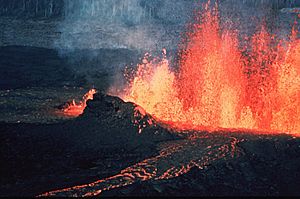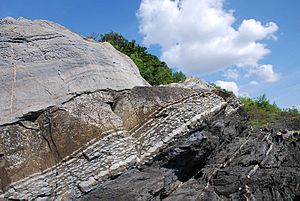Earth science facts for kids

Earth science is a big name for all the sciences that study our planet, Earth. You might also hear it called geoscience.
It's a wider term than just geology. This is because it also includes parts of planetary science, which is a branch of astronomy. Earth sciences look at Earth's atmosphere (the air around us), its oceans, and the biosphere (all living things). It also studies the solid ground we walk on.
Earth scientists use tools from many other subjects. These include physics, chemistry, biology, and mathematics. They use these tools to understand Earth and how it has changed over time.
One key idea in Earth science is that Earth is a very old planet. It has been changing constantly since it first formed. These changes are much bigger than people used to think!
What Earth Scientists Study

Earth science covers many different areas. Here are some of the main ones:
Geology
Geology is the study of the rocky parts of Earth's crust. This includes how they formed and how they've changed over history. Some parts of geology are:
- Mineralogy and Petrology: Studying different minerals and rocks.
- Geochemistry: Looking at the chemicals that make up Earth.
- Geomorphology: Studying how Earth's surface changes, like mountains and valleys.
- Paleontology: Learning about ancient life through fossils.
- Stratigraphy: Studying layers of rock to understand Earth's history.
- Structural geology: Looking at how rocks bend and break.
- Sedimentology: Studying how sand, mud, and other sediments are formed and moved.
Geophysics and Geodesy
Geophysics looks at Earth's shape and how it reacts to forces. It also studies Earth's magnetic and gravity fields. Geophysicists explore Earth's deep core and mantle. They also study plate tectonics and earthquakes. Geodesy is about measuring and understanding Earth's shape and gravity.
Soil Science
Soil science studies the very top layer of Earth's crust. This is where soil forms and where plants grow.
Oceanography and Hydrology
Oceanography studies the oceans, including their currents, waves, and marine life. Hydrology looks at all the freshwater on Earth. This includes rivers, lakes, and groundwater. A part of hydrology called limnology focuses specifically on lakes and ponds.
Glaciology
Glaciology is the study of all the icy parts of Earth. This includes glaciers, ice sheets, and sea ice.
Atmospheric Sciences
Atmospheric sciences study the gases that surround Earth. This is called the atmosphere. It goes from the ground up to about 1000 kilometers high. Key areas include:
- Meteorology: Studying the weather.
- Climatology: Studying long-term weather patterns and climate.
- Atmospheric chemistry and physics: Looking at the chemicals and physical processes in the air.
Astronomy and Planetary Science
Astronomy involves studying distant stars and galaxies. It also looks at Earth from a space point of view. Planetology is a part of astronomy that focuses on our solar system and its planets, including Earth.
Other Related Fields
Other subjects closely linked to Earth sciences are physical geography and biology.
Key Earth Science Topics
Here are some important topics covered in Earth science:
Atmosphere (Air)
- Atmospheric chemistry: What chemicals are in the air.
- Climatology: The study of Earth's climate.
- Meteorology: The study of weather.
- Paleoclimatology: Studying past climates on Earth.
Biosphere (Life)
- Biogeography: Where living things are found on Earth.
- Paleontology: Studying ancient life through fossils.
- Micropaleontology: Studying tiny fossils.
Hydrosphere (Water)
- Hydrology: The study of water on Earth.
- Limnology: The study of lakes and freshwater.
- Hydrogeology: The study of groundwater.
- Oceanography: The study of oceans.
- Marine biology: The study of ocean life.
- Paleoceanography: Studying past oceans.
- Physical oceanography: The physical properties of oceans.
Lithosphere or Geosphere (Solid Earth)
- Geology: The study of Earth's solid parts.
- Environmental geology: How geology affects the environment.
- Historical geology: Earth's history through rocks.
- Planetary geology: Geology of other planets.
- Sedimentology: How sediments form and move.
- Stratigraphy: Layers of rock and their history.
- Structural geology: How rocks are shaped by forces.
- Geography: The study of Earth's features.
- Physical geography: Natural features of Earth.
- Geochemistry: The chemistry of Earth.
- Geomorphology: How Earth's surface changes.
- Geophysics: The physics of Earth.
- Geodynamics: How Earth's interior moves.
- Geomagnetics: Earth's magnetic field.
- Seismology: The study of earthquakes.
- Glaciology: The study of ice.
- Mineralogy: The study of minerals.
- Crystallography: The study of crystals.
- Petrology: The study of rocks.
- Volcanology: The study of volcanoes.
Pedosphere (Soil)
- Soil science: The study of soil.
Earth Systems
- Environmental science: How living things and their environment interact.
- Geography: The study of Earth's surface.
- Gaia hypothesis: An idea that Earth is a self-regulating system.
Other Areas
- Cartography: Making maps.
- Geostatistics: Using statistics in Earth science.
- Geodesy: Measuring Earth's shape and gravity.
Images for kids
-
The rocky side of a mountain creek in Costa Rica
-
The magnetosphere shields the surface of Earth from the charged particles of the solar wind. (image not to scale.)
See also
 In Spanish: Ciencias de la Tierra para niños
In Spanish: Ciencias de la Tierra para niños



